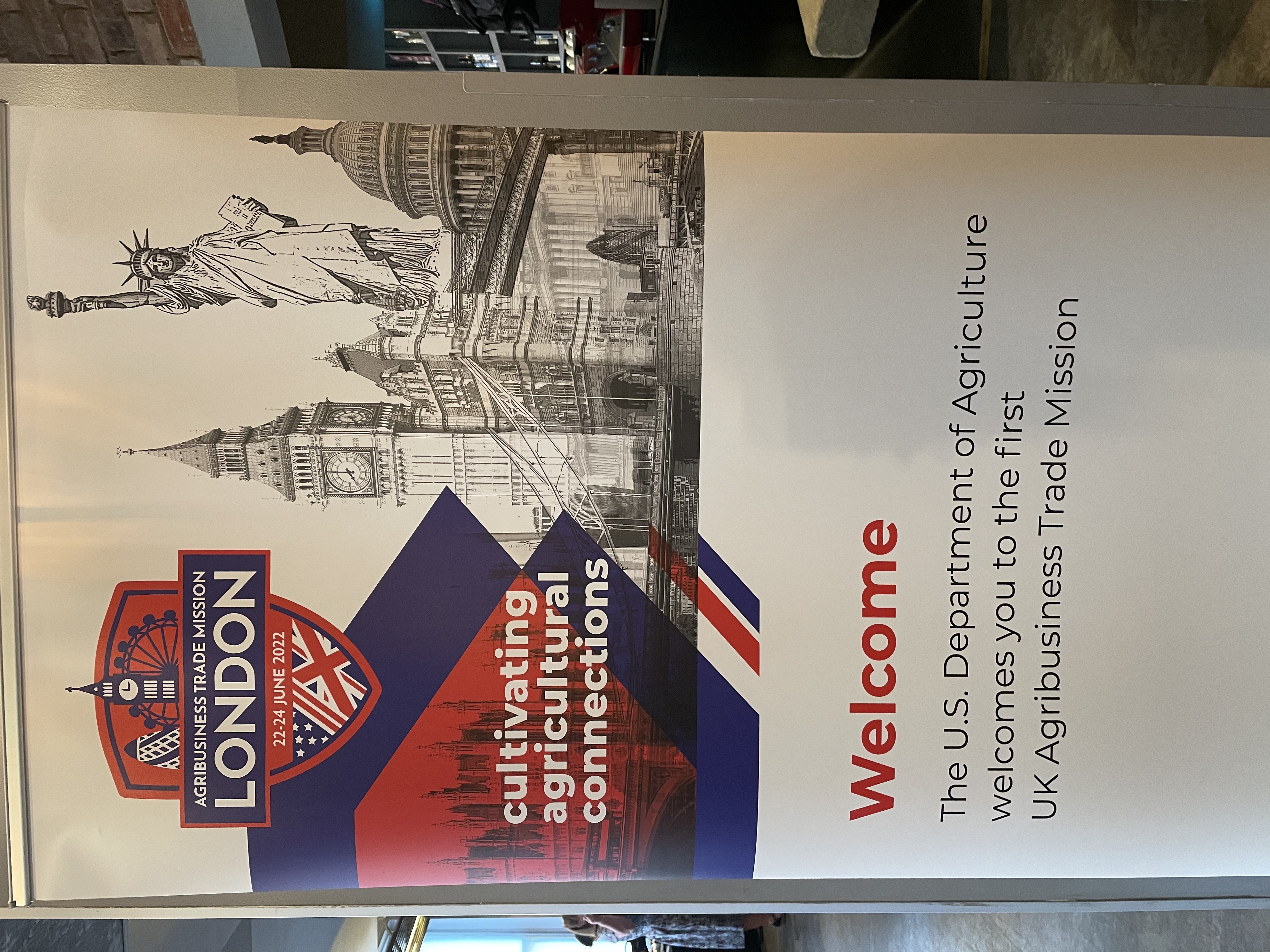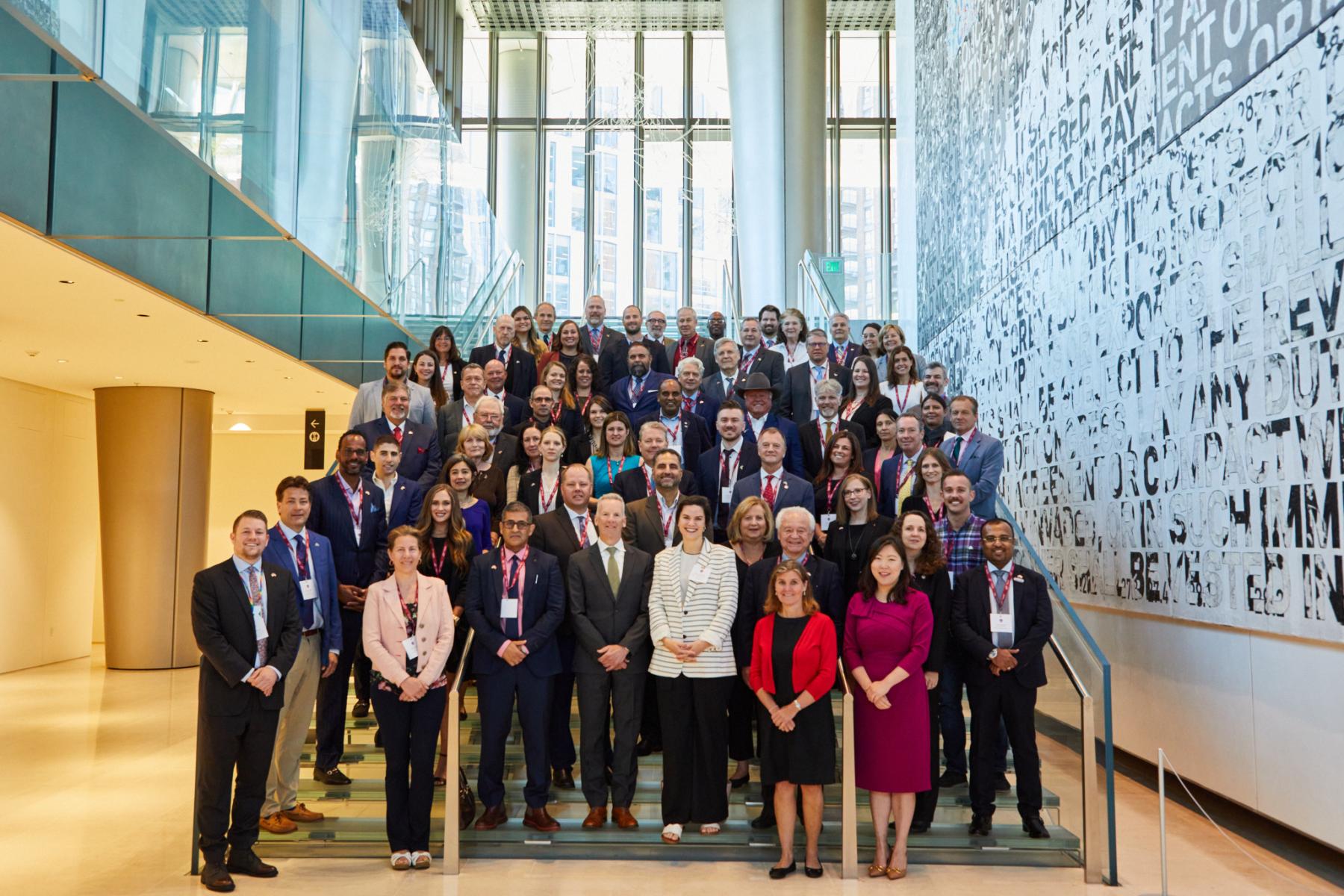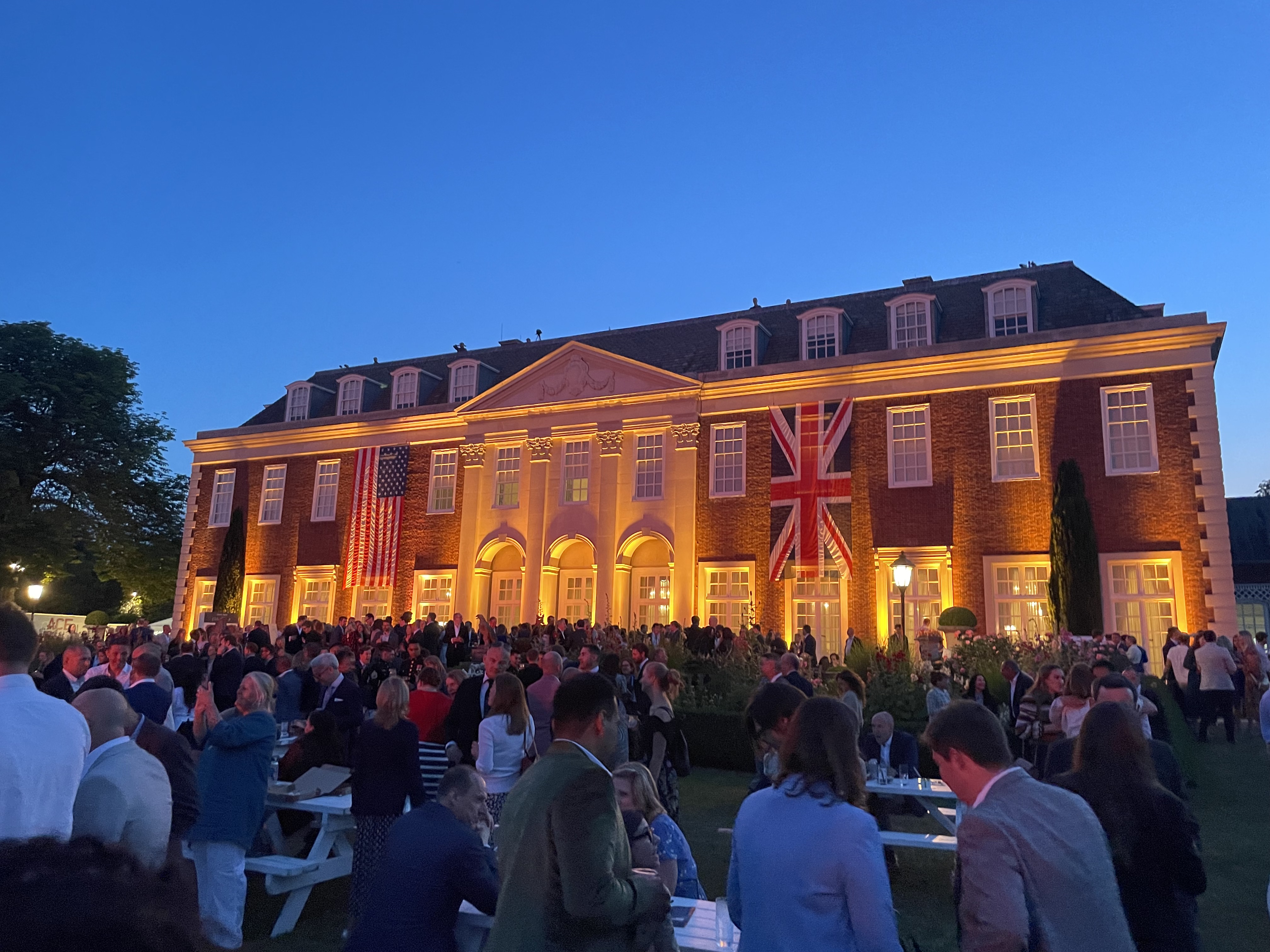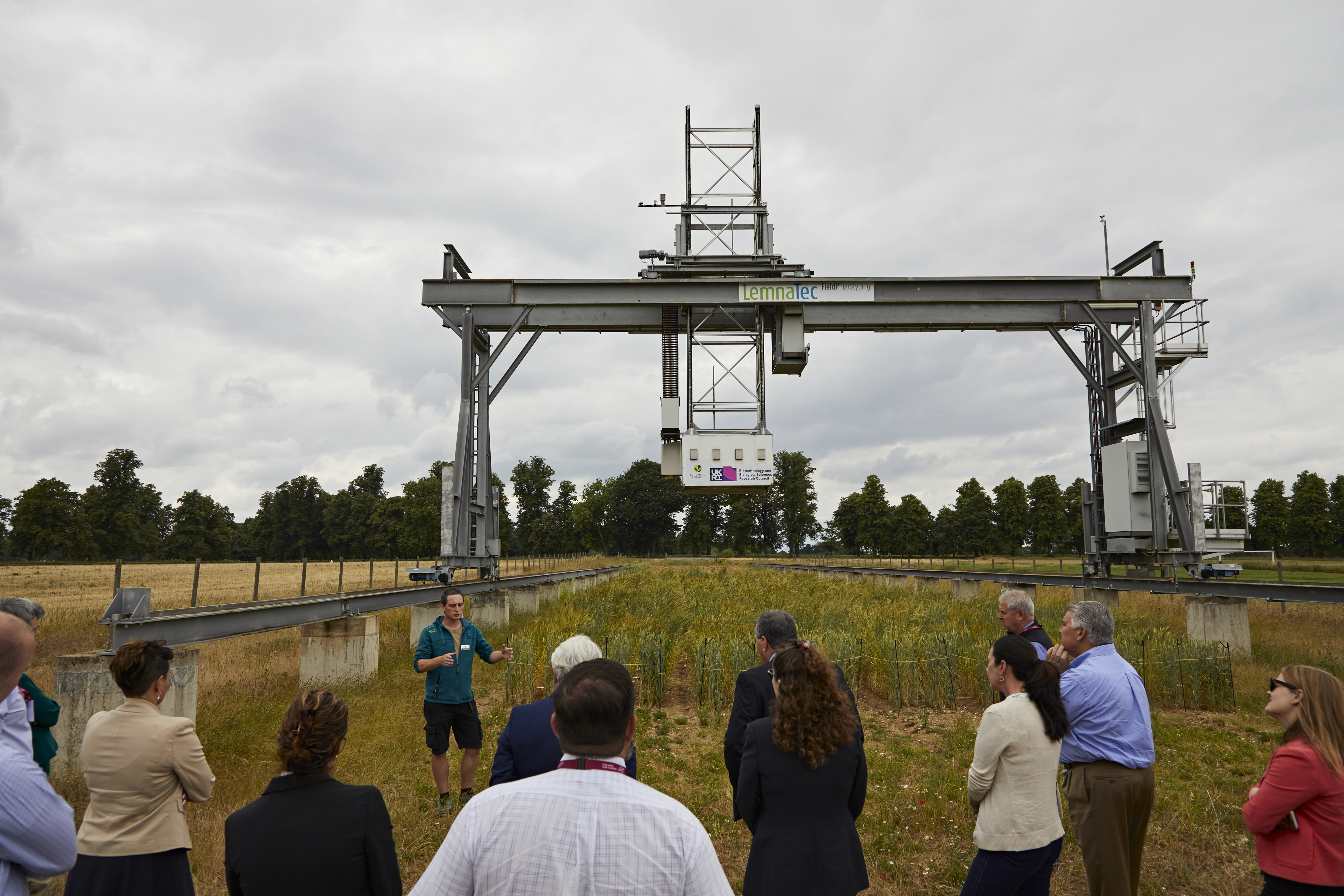When Kristina Watson, Agricultural Trade Specialist, established her position at the Pennsylvania Department of Agriculture in early April, she never imagined she would be boarding a flight for London less than three months later. In June, Watson joined the U.S. Department of Agriculture's (USDA) first Agribusiness Trade Mission (ATM) to the United Kingdom. Below are Watson's reflections from the trade mission.
The UK is a top market for Pennsylvania and U.S. products. Knowing that, I was excited about the opportunity to promote Pennsylvania agriculture, learn about the UK market and consumer preferences, and make valuable connections to help our industry. Additionally, the department had hosted a delegation from the UK in late April, so the ATM offered a great opportunity to build on Pennsylvania's relationship with the UK. Ultimately, my goal was to utilize the knowledge gained and relationships cultivated on the trade mission to create future opportunities for Pennsylvania food and agricultural producers and processors.
USDA Deputy Secretary Jewel Bronaugh led the ATM and the delegation of representatives from 37 U.S. agribusinesses, as well as farm organizations, and 11 state departments of agriculture.

USDA kicked off the first evening with a reception featuring miniature portions of classic UK dishes, such as fish and chips, bangers (sausages) and mash (potatoes), curry, Eton mess (fruit and crumbled hard meringues in cream), apple crumble, and more. This was the first chance to cultivate relationships – and it was great to meet staff from USDA, including the Foreign Agricultural Service (FAS), embassy officials, and other trip participants. I particularly enjoyed getting to know a couple who owns a small brewery in Maine and were on the trade mission to grow their exports.
For most of the ATM, we were separated into smaller groups, enabling each person to participate in targeted activities. Additionally, the agribusiness participants took part in business-to-business meetings with the goal of creating export opportunities in the UK market.
Day 1 – June 22

The first morning, we traveled to the U.S. Embassy London overlooking the River Thames in the Nine Elms district of London. The U.S. Embassy opened its doors in 2018, after relocating from the old Mayfair location. During a tour of the facility, we learned that the U.S. government's move to the area helped spur investment in the former industrial neighborhood. The Embassy and grounds were designed with sustainability in mind, and the use of brownfield redevelopment, natural habitat creation, responsibly sourced building materials, and energy efficient equipment, helped the project receive LEED Gold ratings.
During our visit to the Embassy, we were welcomed by the Embassy's Chargé d'Affaires, Matthew Palmer, who made a great point: "Food is central to human relations … and central to the role of diplomacy." Other speakers highlighted the importance of breaking bread and agricultural and food products as key to improving relationships with others. We also heard about the key cultural and tourism ties between the two nations, and the fact that so many UK tourists visit the U.S. means that they get exposure to American brands, which then creates demands for imports.
We also received briefings by Embassy staff and local professionals on UK politics and economics, consumer markets, food and hospitality, trade and market analysis, and food standards. Similar to U.S. consumers, UK consumers are looking for high quality food, and care about animal welfare, sustainability, and food safety. Additionally, similar to the U.S., UK consumers are facing issues such as inflation, supply chain issues, impact of COVID and re-evaluating of priorities, and high energy costs. Stores are navigating these challenges, while also adjusting to new shopping habits brought on by the pandemic. Finally, as the UK resets priorities following Brexit (the UK's departure from the European Union), the U.S. has a unique opportunity to improve our trading relationship with the UK.
Following the briefings, the Embassy hosted us for a traditional British tea outdoors on Embassy grounds. We all enjoyed drinking tea and sampling traditional foods such as Scotch eggs (hardboiled egg in breaded sausage), sausage rolls, and thin crustless sandwiches with fillings such as smoked salmon, prawn salad, egg salad, as well as pastries. Over tea, the group at my table – a mix of FAS staff, cooperators, and state departments of agriculture staff – spoke about trade missions and the responsibilities of the FAS.
In the afternoon, we traveled to Partridges, a family-run food shop in Chelsea, which is in central London. We were met by one of the owners, who shared that the store has a Royal Warrant and is proud to serve fine, quality foods. Partridges is also known for a huge selection of American products, which the store has slowly built up over time. Once inside, I was excited to spot Pennsylvania products such as Snyder's of Hanover salsa, Reese's peanut butter cups, and a variety of Hershey's chocolate and syrups nestled among the shelves of American products.
We wrapped up the day on the Millennium Diamond for a river cruise on the Thames. It was fascinating to learn about the river's history through the years, and to see the Palace of Westminster (Parliament), Tower of London, the Tower Bridge, the U.S. Embassy, and more. But, more importantly for the purposes of the ATM, was the ability to network with those on the boat – ATM participants, UK businesses, UK government officials, and Embassy staff. I enjoyed the opportunity to reconnect with several members of the delegation from the UK who had visited Pennsylvania in April, and to meet a representative of a UK company interested in Pennsylvania agriculture, and just learning more about the ATM participants.
Day 2 – June 23

On day two, the state departments of agriculture participants arrived at the Palace of Westminster (also known as the Houses of Parliament – think Big Ben) on a rainy, overcast morning. Walking through the doors of Parliament and into Westminster Hall for business was a true career highlight. Westminster Hall is the oldest building on the grounds (building started in 1097) and has been used for a variety of functions through the years. When we arrived at the House of Commons, we saw the Speaker's Procession before taking our seats in the visitor's gallery.
From the gallery, we watched Ministers from the UK Department for Environment, Food, and Rural Affairs (DEFRA) during Question Time, when they answer questions about matters that they handle within their department. It was interesting to hear key DEFRA ministers – including the Rt. Hon George Eustice MP (member of parliament), Secretary of State for Environment, Food, and Rural Affairs, who was also part of the delegation that visited Pennsylvania – answer questions from the MPs in the House of Commons, especially since many of the issues discussed (food and energy prices, environmental issues, and more) echo the key issues in the U.S. as well. While we were there, Secretary of State Eustice announced to the House of Commons that the UK will join the U.S.-led Sustainable Productivity Growth Coalition.
Following Question Time, we met with Rt. Hon Penny Mordaunt who is the Minister of State for Trade Policy. We had a great conversation with Minister of State Mordaunt regarding trade between the U.S. and the UK, free trade agreements, sustainability and animal welfare, importance of increasing understanding of agricultural practices and reducing misunderstanding, global food security, and supply chain resilience. She also talked about interest in engaging in memoranda of understanding with U.S. states on items of mutual interest. Minister of State Mordaunt took us on a quick tour of the Chapel of St. Mary Undercroft, a wonderfully ornate and historic chapel which dates back to its initial completion in 1297. Many of us invited the Minister of State to visit our states, so hopefully we will see her in Pennsylvania in the future.
After returning to the hotel, the state departments of agriculture group met with USDA Deputy Secretary Bronaugh for a roundtable discussion about agriculture and trade. Most of our conversation centered on telling the story of American agriculture and sharing the message about the great products in the U.S. and reaching consumers in target markets, such as the UK. We discussed the challenges and opportunities of addressing misperceptions of American agriculture at home and abroad, the need for more funding for export promotion and market development (such as through the Market Access and the Foreign Market Development programs), the need for a free-trade agreement between the U.S. and the UK, and more.
That evening, we headed to Winfield House, the residence of the Ambassador of the United States of America to the Court of St. James's, for their annual Independence Day celebration. Ambassador Jane Hartley welcomed everyone to the celebration which included representatives of the state departments of agriculture, UK government officials, and many others. We also heard the UK and U.S. national anthems, and enjoyed music and fireworks. The event had a fair atmosphere, and featured traditional American foods such as hot dogs, mac and cheese, sweet potato fries, pizza, and more. Chef Peter Sidwell also did a cooking demonstration highlighting American ingredients.
During the event, I had the opportunity to interact with my fellow ATM participants, met Chargé d'Affaires Palmer, spoke again with Minister of Trade Mordaunt, and discussed agriculture and food with representatives from DEFRA, including individuals who had visited Pennsylvania. The event tillustrated the concept of food as diplomacy – and the popularity of American food, as I observed the mainly British crowd queueing (in often very long lines) for a small taste of American food and beverages. I really enjoyed being able to connect with key agriculture and trade officials in a more informal atmosphere. The event also served to highlight the interest in American exports, and the potential for continued and future trade in food.
Day 3 – June 24

For the last day of the ATM, we headed north to Rothamsted Research in Hertfordshire. The facility is the oldest continually operating research station in the world. There, we learned about the partnership between John Bennet Lawes and Joseph Henry Gilbert, which created the foundation for modern scientific agriculture and established the principles of crop nutrition. Rothamsted Research has three campuses and an additional field trial site, operates a £32 million research budget, and seeks to use cutting-edge strategically placed science to generate new knowledge to meet current and future challenges facing agriculture. Their challenge focus between 2023 and 2028 is on climate change, functional biodiversity, and food and energy security. Some of the projects highlighted included research on carbon sequestration in soils, digital and precision ag, and regenerative agriculture.
We also visited some of Rothamsted's research sites, including the Broadbalk Experiment, which studies the production of wheat grown continuously and in rotation and has been in existence since 1843. Another highlight was the field scanalyzer, a fully automated field phenotyping platform. The machine is able to monitor crops in a certain location with high resolution, and the data is used to provide key data on plant growth and vigor. It was fascinating to see the large machine slowly and methodically survey the field.
Back in London, we stopped in Battersea to visit Mondo Brewing Company, where we met Todd Matteson and Thomas Palmer, American brewers who founded their company in 2014. They mill their own grain, import their hops from Washington State, and produce several core beers, along with a seasonal range. Mondo has a true collaborative approach and often partners with other brewers to create seasonal releases. They are known for the quality of their beers and the unique artwork that graces their cans, and just this year won three International Brewing Awards (and have won other awards over the years as well). Their commitment to the quality ingredients and an excellent product was evident, as was their commitment to the community and those in need. I later learned that they are a Work in Progress Brewery working with other breweries who aspire to a more inclusive and representative beer industry.
Summary
As I indicated earlier, my goals for the ATM focused on building knowledge and relationships to ultimately increase export opportunities for Pennsylvania food and agricultural producers and businesses. UK consumers are looking for high-quality food and value sustainability, animal welfare, and food safety, and it is clear that Pennsylvania has much to offer the UK market. Thanks to the more than 52,000 farms in Pennsylvania (and many more around the U.S.), food and agribusiness companies in the commonwealth are producing a diverse range of products. Some of these products are already being exported, but we can export even more.
Additionally, one of the best parts of the trip was the opportunity to network with leaders and staff from other state departments of agriculture, cooperator groups, agricultural businesses, USDA, the U.S. Embassy in London, and the UK government. Learning about how other state departments of agriculture help promote their states' agricultural products at home and abroad will be particularly useful and Pennsylvania seeks to elevate our agricultural products in foreign markets.
In reflecting on my trip to the UK, two things stated by speakers on the first day were made very clear during the trade mission.
- First, the commonalities between UK and U.S. consumers are greater than the differences. We all want the same things: tasty, high-quality, affordable food that is responsibly produced.
- Second, to put it simply – food matters. Food matters in so many ways – it is pivotal in diplomacy, trade, national security, and the economy; it is a livelihood for farmers and agribusinesses; and it is social, cultural, symbolic, and necessary to survive.
Fortunately, Pennsylvania's food and agricultural producers and businesses have much to offer globally. Our farmers and agribusinesses can deliver, high-quality food and agricultural products to consumers in the UK and around the world, and the Pennsylvania Department of Agriculture and our state, national, and global partners can all play a role in developing new market opportunities.
Additional photos of the Trade Mission are available on the Pennsylvania Department of Agriculture's Flickr.